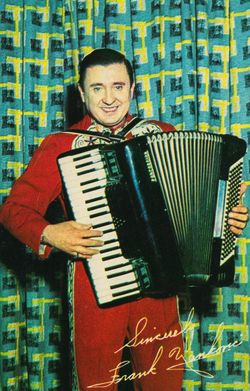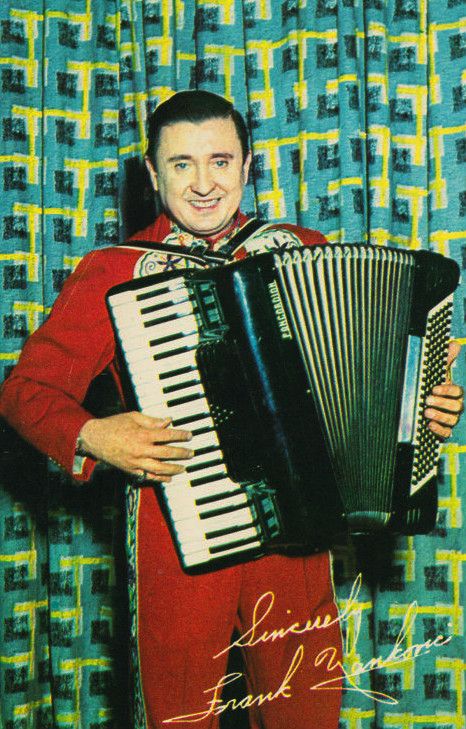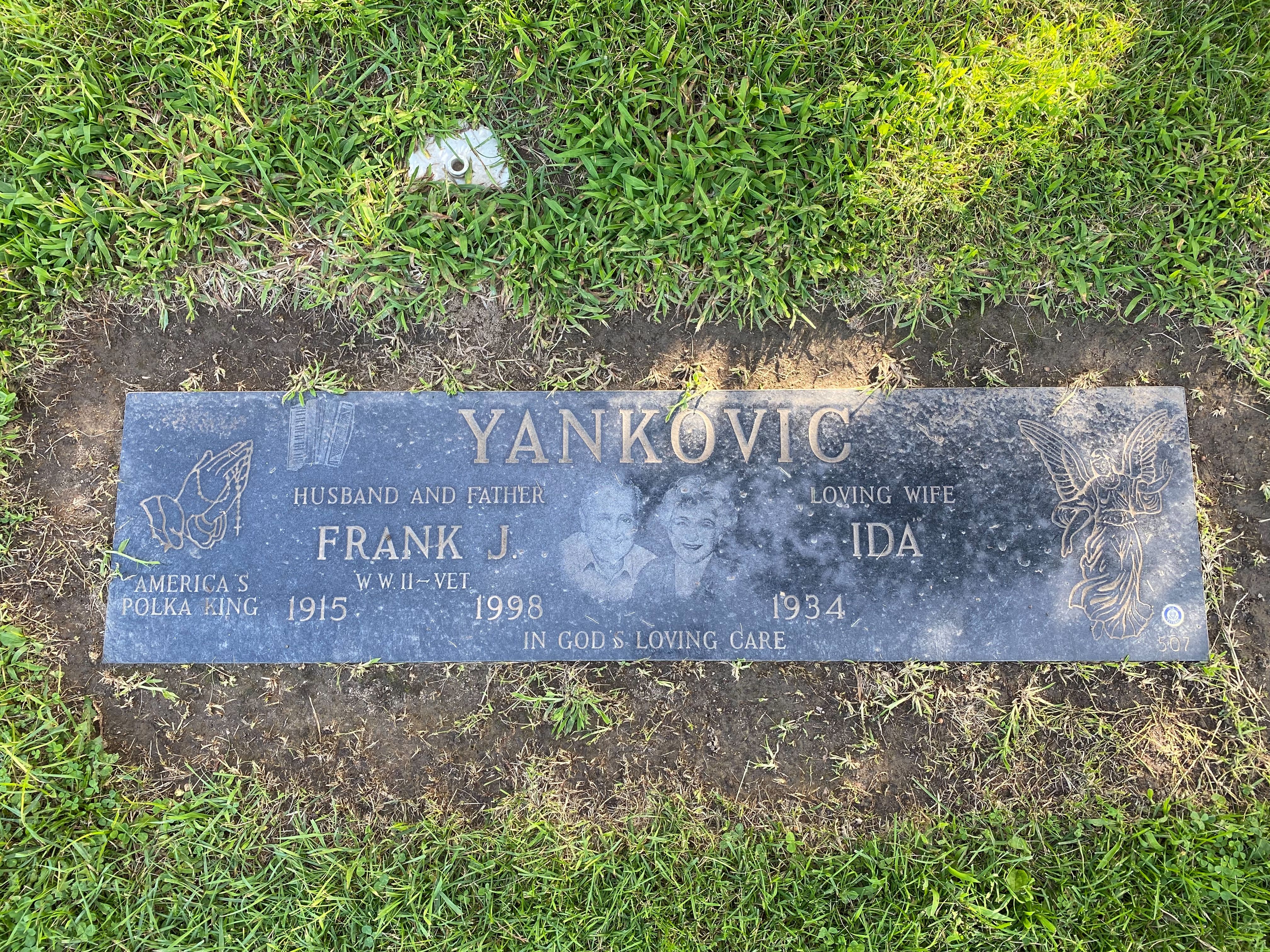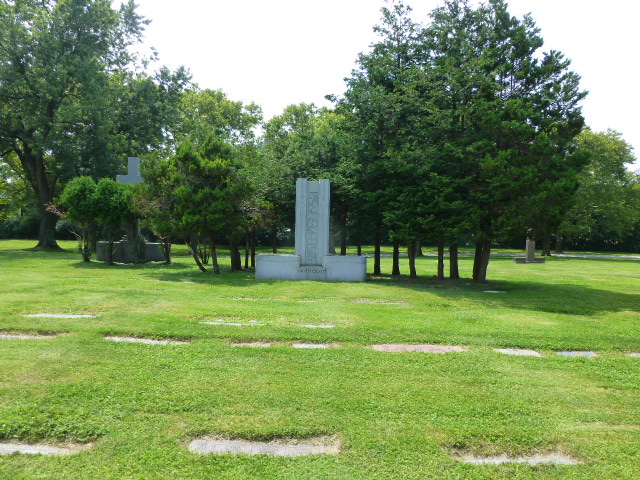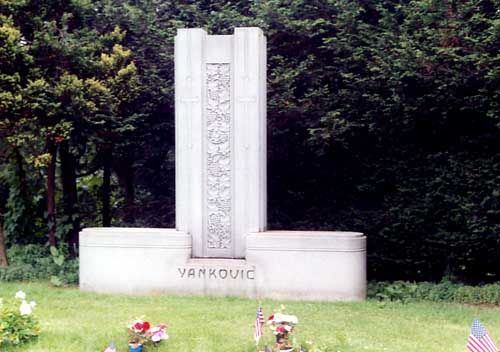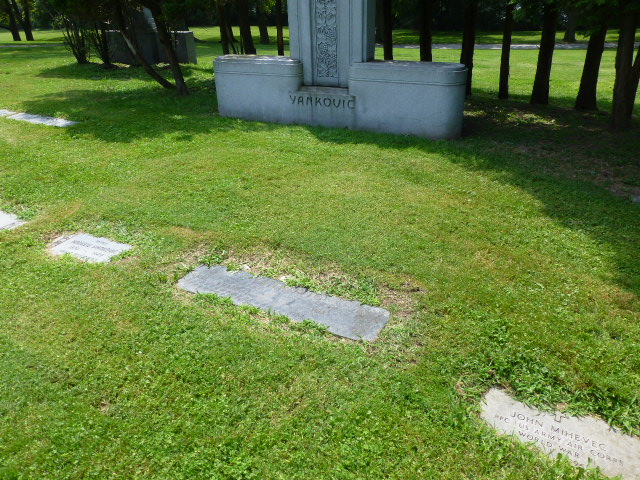Polka Musician and Bandleader. Born in West Virginia to Slovenian immigrant parents, his family soon moved to the Collinwood neighborhood of Cleveland, Ohio, where Frankie spent most of his childhood and early adult life. Before the age of 9 he took accordion lessons from a boarder in the Yankovic home to the dismay of his father who thought he could never make a living as a musician. He first performed on the radio in 1932 on a Slovenian music program. In 1938, after being turned down by Columbia and RCA Records, he made two records under his own "Yankee" label using the name The Slovene Folk Orchestra. These became local hits in Cleveland. In 1941 he opened a tavern where he also performed. In 1943, he enlisted in the Army and went overseas. While fighting in the Battle of the Bulge, he suffered frostbite to his feet and hands that resulted in gangrene. He refused to allow the doctors to amputate, and eventually recovered and was again able to make music. Returning home after the War, he continued to operate his Yankovic Bar, and in 1947 he recorded "Just Because" with Columbia Records. When released, it made him a star and sold over a million copies. That same year, along with his band The Yanks, he won the title "America's Polka King" at a contest in Milwaukee, Wisconsin. He realized that music would be his lifelong career, so he sold the bar and went on the road full-time. His second hit, "Blue Skirt Waltz," rose even faster in the charts. With his ever-changing band line-up he continued to tour and record, and for a while he was the star of the "Yankovic Show" in Cleveland. Due to his touring obligations it was later renamed "Polka Varieties", becoming a long running Sunday morning program on WEWS-TV. He also starred on television shows in Chicago and Buffalo, both named "The Frankie Yankovic Show: America's Polka King." Singing mostly in English, he updated this style of music from Central and Eastern Europe for American audiences, earning polka new listeners. However, to acknowledge his heritage and most loyal fans, he always performed at least one song in Slovenian. In 1969, he became one of the first musicians to be inducted into the International Polka Association Polka Hall of Fame, and was also named Federation of Slovenian Homes' Man of the Year. In 1977, he had his autobiography written, "The Polka King: The Life of Frankie Yankovic", as told by Robert Dolgan. In 1985, his album "70 Years of Hits" won the first Grammy awarded in the Polka category. His final two records, "Songs of the Polka King, Vols. 1 and 2", were also nominated for Grammies. He was a charter member of the Cleveland-style Polka Hall of Fame, located in his old Collinwood neighborhood, and although he officially retired in 1994, he continued to perform until 15 months before his death. Some of his best known songs were "In Heaven There Is No Beer", "Beer Barrel Polka", "Pennsylvania Polka", "The Too Fat Polka", and "Who Stole the Kichska?" Said to have been planning a move back to Cleveland in 1998, he suffered a fall in his Florida home and died of heart failure 14 days later. His funeral mass was held at Saint Mary's Catholic Church in Cleveland, and afterwards his hundreds of mourners sang along to a serenade by accordion players, continuing a celebration of his life in song along the route to the cemetery. He had asked for no tears at his passing, and had once been quoted, "Polkas make you forget your troubles... it's the happiest music this side of heaven."
Polka Musician and Bandleader. Born in West Virginia to Slovenian immigrant parents, his family soon moved to the Collinwood neighborhood of Cleveland, Ohio, where Frankie spent most of his childhood and early adult life. Before the age of 9 he took accordion lessons from a boarder in the Yankovic home to the dismay of his father who thought he could never make a living as a musician. He first performed on the radio in 1932 on a Slovenian music program. In 1938, after being turned down by Columbia and RCA Records, he made two records under his own "Yankee" label using the name The Slovene Folk Orchestra. These became local hits in Cleveland. In 1941 he opened a tavern where he also performed. In 1943, he enlisted in the Army and went overseas. While fighting in the Battle of the Bulge, he suffered frostbite to his feet and hands that resulted in gangrene. He refused to allow the doctors to amputate, and eventually recovered and was again able to make music. Returning home after the War, he continued to operate his Yankovic Bar, and in 1947 he recorded "Just Because" with Columbia Records. When released, it made him a star and sold over a million copies. That same year, along with his band The Yanks, he won the title "America's Polka King" at a contest in Milwaukee, Wisconsin. He realized that music would be his lifelong career, so he sold the bar and went on the road full-time. His second hit, "Blue Skirt Waltz," rose even faster in the charts. With his ever-changing band line-up he continued to tour and record, and for a while he was the star of the "Yankovic Show" in Cleveland. Due to his touring obligations it was later renamed "Polka Varieties", becoming a long running Sunday morning program on WEWS-TV. He also starred on television shows in Chicago and Buffalo, both named "The Frankie Yankovic Show: America's Polka King." Singing mostly in English, he updated this style of music from Central and Eastern Europe for American audiences, earning polka new listeners. However, to acknowledge his heritage and most loyal fans, he always performed at least one song in Slovenian. In 1969, he became one of the first musicians to be inducted into the International Polka Association Polka Hall of Fame, and was also named Federation of Slovenian Homes' Man of the Year. In 1977, he had his autobiography written, "The Polka King: The Life of Frankie Yankovic", as told by Robert Dolgan. In 1985, his album "70 Years of Hits" won the first Grammy awarded in the Polka category. His final two records, "Songs of the Polka King, Vols. 1 and 2", were also nominated for Grammies. He was a charter member of the Cleveland-style Polka Hall of Fame, located in his old Collinwood neighborhood, and although he officially retired in 1994, he continued to perform until 15 months before his death. Some of his best known songs were "In Heaven There Is No Beer", "Beer Barrel Polka", "Pennsylvania Polka", "The Too Fat Polka", and "Who Stole the Kichska?" Said to have been planning a move back to Cleveland in 1998, he suffered a fall in his Florida home and died of heart failure 14 days later. His funeral mass was held at Saint Mary's Catholic Church in Cleveland, and afterwards his hundreds of mourners sang along to a serenade by accordion players, continuing a celebration of his life in song along the route to the cemetery. He had asked for no tears at his passing, and had once been quoted, "Polkas make you forget your troubles... it's the happiest music this side of heaven."
Bio by: Cherie Atkinson Clark
Inscription
Husband and Father
W.W.II-Vet
America's Polka King
Family Members
Advertisement
